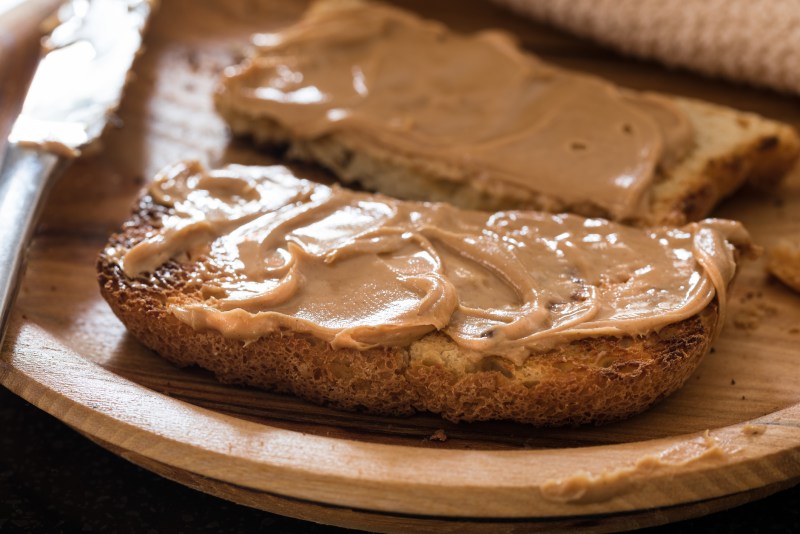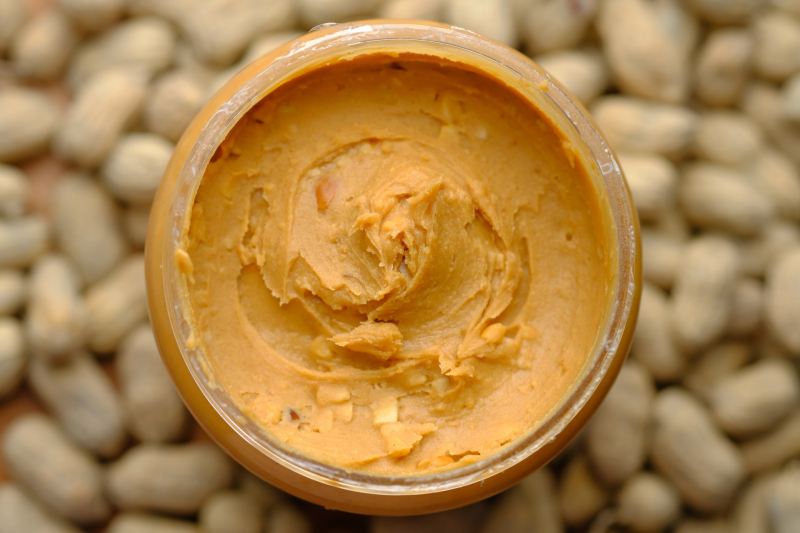
If you’re like us, you put peanut butter on anything and everything. Peanut butter is by far the most popular among the nut butters, and you’d be hard-pressed to find a food that it doesn’t complement or make better. Bread and jam are the classic go-to, but it also has a long-standing relationship with chocolate, bananas, and smoothies. It’s great in some unconventional scenarios, as well, like on a burger, and is used in a lot of Asian recipes.

Peanut butter FAQs
Based on its deliciousness and versatility, you may be wondering how much peanut butter is too much. We’ll address some of the most popular questions around the spread and get to the bottom of the healthiness of peanut butter.
What is peanut butter?
Peanut butter is a spread made from ground peanuts, which in their natural state, are pretty good for you. For more info on peanut nutrition, check out Peanut Nutrition 101 from the National Peanut Board. The peanut butter process involves roasting the peanuts and grinding them into fine particles before blending them into a thick paste. This base process delivers unprocessed food that’s healthy for everyday use.
However, many commercial brands add various ingredients to their peanut butter, including vegetable oils and sugar. So, when shopping for peanut butter, check all the nutritional and processing info. Check the label to ensure the product has only peanuts and maybe some salt for a healthier option.
Is eating too much peanut butter bad?
Excessive consumption of peanut butter can lead to weight gain, high cholesterol levels, and increased sugar levels. This is particularly true when you eat peanut butter that has added ingredients, like sugar and vegetable oil. As with most products, the side effects of eating too much peanut butter vary between people.
How much peanut butter can I eat a day?
As a general rule of thumb, around one to two tablespoons per day is enough. For most high-fat foods, two tablespoons a day are usually ideal. If you’re unsure how much you should eat, it’s advisable to consult a dietician or doctor. This is particularly important if you have a history of allergic reactions to peanut butter or any of its ingredients.
Generally, it’s important to know your health goals and needs. A tablespoon of natural peanut butter has about 90 calories and 7 grams of fat. If you eat 2 to 3 tablespoons a day, you’re adding about 180 to 270 calories and 14 to 21 grams of fat to your body. So, be sure to consider your daily calorie intake goal. For example, most athletes aim to have 3,000-4,000 calories per day.
Is almond butter better than peanut butter?
According to Healthline, almond butter is somewhat better than peanut butter because of its nutritional content. While both butters contain almost the same amounts of sugar and calories, almonds contain fiber, minerals, and vitamins. But peanut butter has more protein than almond butter.
On a nutritional basis, almond makes for a better pick than peanut butter. For those who are more concerned about the taste of their meals, peanut butter makes an exceptional choice. Just be sure to pick a healthy nut butter when shopping. Opt for butter that doesn’t have added sugar, artificial ingredients, or trans fats. The label should include almonds or peanuts and a bit of salt.
Is peanut butter good for cholesterol?
Naturally processed peanut butter has no cholesterol, so you need not worry about it. It contains unsaturated fat, which health experts believe is important in a healthy diet, in moderation. The U.S. Department of Agriculture (USDA) notes that peanut butter contains monounsaturated fat (7.2 g per 2 tbsp), polyunsaturated fat (3.49 g per 2 tbsp), and saturated fat (2.86 g per 2 tbsp)
Is it better to eat natural peanut butter?
In many cases, eating natural peanut butter is considered a better option than eating regular peanut butter. Here are the pros of eating natural peanut butter:
- Fewer ingredients: Natural peanut butter typically contains just peanuts, sometimes with a pinch of salt. This means it’s free of added sugars, hydrogenated oils, and other additives which may not be desirable from a health perspective.
- Higher nutrition: Natural peanut butter often retains more of the peanuts’ natural nutrients like protein, fiber, healthy fats, and vitamins E and B3.
- Lower sugar content: Compared to regular peanut butter, natural versions generally have less sugar, making them a more appropriate choice for controlling blood sugar levels and managing weight.
- Less processed: Natural peanut butter undergoes minimal processing, preserving the flavor and texture of the peanuts.
Can you lose weight eating peanut butter?
Peanut butter is rich in protein, fat, and fiber, which can help you feel fuller longer. This means you’ll not experience frequent cravings or hunger, reducing the chances of snacking on unhealthy foods. So, it’s possible that peanut butter can aid your weight loss efforts.
A 2019 study also showed that people who ate nuts regularly had lower chances of experiencing obesity. As always, consult your doctor or nutritionist to see how peanut butter can be a part of your diet.
Editors' Recommendations
- Your guide to the pescatarian diet for healthier living
- What is chicory coffee? All about this unique variety of our beloved morning drink
- What foods are high in iron? These staples will help you live a healthier life
- 7 delicious, portable, high-protein snacks that will support your weight loss goals
- Is olive oil good for you? All about this healthy fat (and how to use it in your kitchen)




